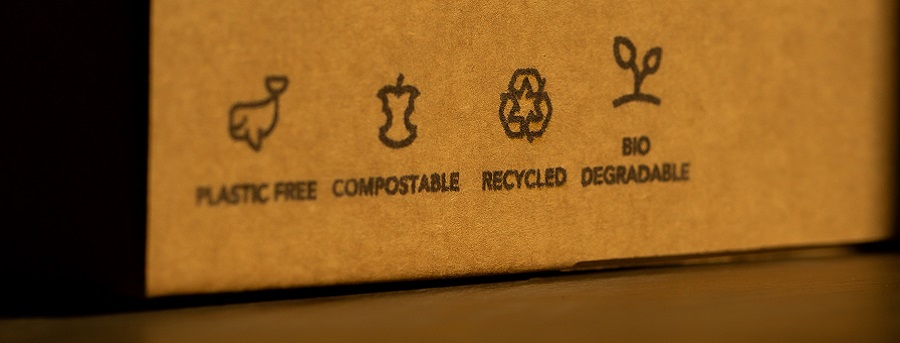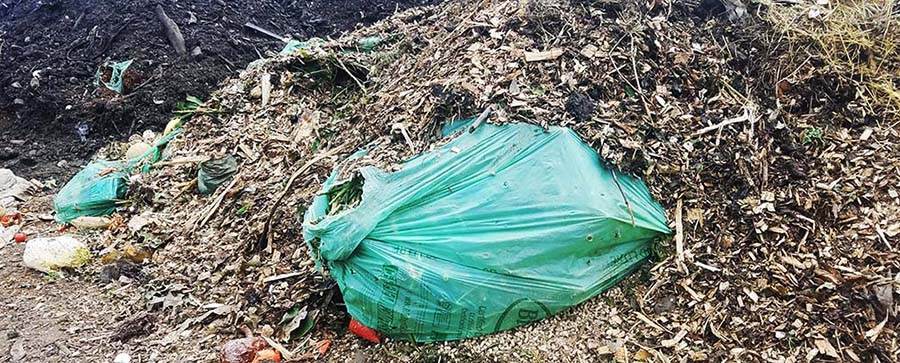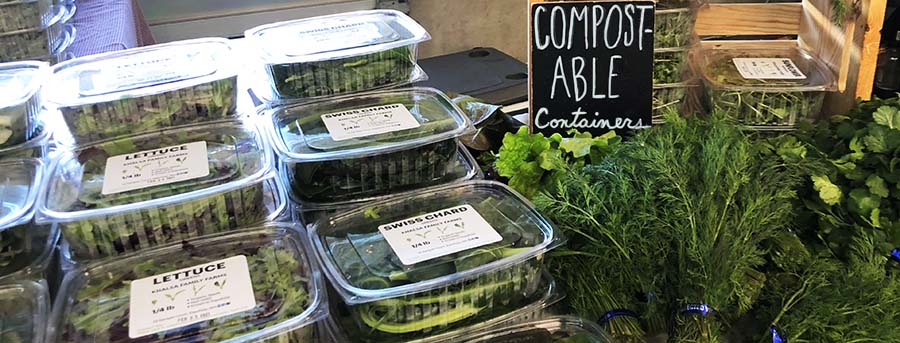
Our world clearly needs to embrace better packaging solutions. The EPA estimated that containers and packaging made up 28% of municipal solid waste in 2018. Included in this were 14.5 million tons of plastic containers and packaging. These plastic polymers persist in the environment causing significant threats to nature, humans, and wildlife, and the amount of plastic we're sending to landfills continues to grow.
Along the way, we’ll address the following:
a. What does biodegradable mean?
b. What does compostable mean?
c. What is the difference between compostable and biodegradable?
d. How do compostable products compare to alternatives?
e. When to look out for greenwashing
f. How to choose the best compostable products
Biodegradable Definition
Biodegradable products are those that can be consumed
by living microorganisms like fungi or bacteria. This helps to break
them down into compounds that are found in nature.
Compostable Definition
Compostable is used to describe a product that can
disintegrate into non-toxic, natural elements. It also does so at a rate
consistent with similar organic materials. Compostable products require
microorganisms, humidity, and heat to yield a finished compost product
(CO2, water, inorganic compounds, and biomass).

Compostable vs. Biodegradable
You can think of both compostable and biodegradable as recycling organic waste using naturally occurring or biological processes.
The main difference between the two is that biodegradable material can take an undetermined time to break down. In contrast, Compostable materials will decompose into natural elements within a specific time frame. However, it will require certain conditions like those found in industrial composting facilities to do so.
A biodegradable product will eventually break down into a few organic materials under the right conditions. This could include a product like a plastic-lined paper coffee cup. While the paper will break down, and eventually the plastic, there is still microplastic waste left behind.
On the other hand, the composting process will turn leftover food scraps, yard trimmings, BioBags, and compostable food packaging products like PLA-Lined paper coffee cups into organic matter or humus. This leaves behind no plastics or chemicals of concern.
To simplify, everything that is compostable is also biodegradable. However, biodegradable does not always mean compostable.
Alternatives to Compostable Products
As if distinguishing compostable from biodegradable isn’t tough enough, there are a few other similar terms that we should mention:
Zero waste, as defined by the Zero Waste International Alliance (ZWIA), can certainly be used to describe a compostable product. It indicates something that can be consumed and recovered “without discharges to land, water, or air that threaten the environment or human health.”
Degradable is a highly ambiguous term. It’s important to remember that plastic products along with most other products on our planet are technically degradable. They can be chemically or biologically degraded but this process can take hundreds or thousands of years. In the case of plastic, this degradation is also associated with releasing toxic chemicals and creating microplastics.
Greenwashing Alert
With increasing demand for eco-friendly packaging, some manufacturers label products as "biodegradable", as this requires no certification. Manufacturers may get away with this term even when it takes years or decades to fully break down.
This is known as "greenwashing". Environmental benefits are implied but the claims don’t match what the consumer believes they’re getting. One of the best definitions of biodegradable in regards to packaging comes from the EPA:
“The term ”biodegradable” when used for marketing purposes includes a time component regarding the length of time it takes for the plastic to fully degrade... It is deceptive to make an unqualified degradable claim for items entering the solid waste stream if the items do not completely decompose within one year after customary disposal.”
The Federal Trade Commission (FTC) produced their Green Guides in an attempt to prevent marketers from making misleading claims. For compostable claims, manufacturers must have scientific evidence demonstrating that all materials become usable compost in a timely manner.
When we see the terms biodegradable or compostable on a product label, we should look for one more thing: a certification.

Choosing the Best Compostable Products
Currently, in the U.S., there is no official way for ensuring biodegradability. When it comes to compostable items, however, they must pass testing before being labeled as such:
ASTM Standard D6400: For a product to be labeled “industrially compostable” or “commercially compostable,” it must meet standards established by the American Society for Testing and Materials (ASTM). Standard D6400 indicates that breakdown occurs within 180 days and that the final product is not toxic to the environment. This is also equivalent to EN13432, which assures the same in Europe and abroad.
ASTM Standard D6868: ASTM D6868 indicates products that can be composted in industrial aerobic composting facilities without negatively affecting the environment. This standard is used for products with a film or coating made with biodegradable plastic.
Biodegradable Product Institute: BPI independently verifies the ASTM standards in the US. They ensure that a product can safely contribute to soil after processing at a commercial composting facility.
Compost Manufacturing Alliance(CMA) is also independently performs additional real-world tests to ensure compostability.
TÜV AUSTRIA OK compost HOME: Certifies that a product can is Home Compostable and can break down in the lower heat of a home composting environment in less than a year.
Final Thoughts on Compostable vs. Biodegradable
Because biodegradable is an unregulated term, it merely implies being eco-friendly while often being the opposite. By comparison, compostable materials are environmentally superior.
When looking for environmentally friendly compostable goods, beware of the misleading term “biodegradable”. Instead, look for the various standards and certifications of compostability or “Meets ASTM D6400 standard.”
Are you looking for compostable food packaging? Good Start Packaging can help you get started on your business' sustainability efforts. Explore our line of takeout containers or reach out to one of our packaging solution experts for assistance.
welcom to inquiry our bamboo kraft paper, brown kraft paper,kraft packaging.